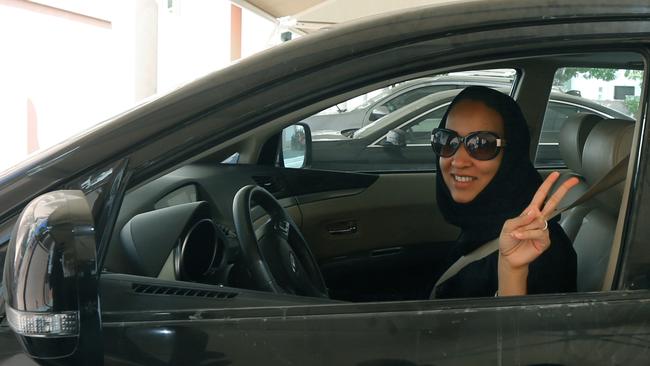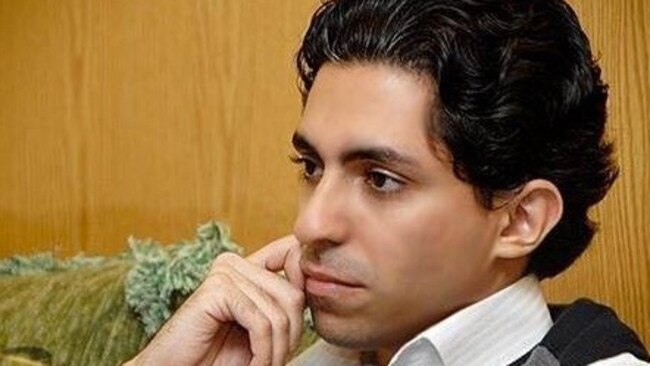
How brave do you have to be to be a Western feminist? I don’t mean to offend anyone, but you really don’t need to be all that brave.
It is right to be a feminist. It’s important. But brave?
You may get smashed on Twitter for expressing your opinion, but who cares what trolls have to say? They’re just a bunch of sad sacks, dressed in old fleece tracksuits with elastic at the ankles, ensconced in their boyhood bedrooms, sucking on a Pepsi Max, with their mums — now in their 70s — wishing they’d move out.
By contrast, how brave do you have to be to be a feminist under the yoke?
We know the answer. Pakistani schoolgirl Malala Yousafzai took a bullet in the head for girls’ education. Saudi feminist Manal al-Sharif went to prison for daring to drive.
Manal, who now lives in Sydney, says “no, no, no” when anyone suggests the campaign she founded in the dark kingdom of Saudi Arabia — Women2Drive — was brave. Yet unquestionably she put her life, her freedom, on the line for women.
Manal was born in Mecca in 1979, around the time that Islamic fundamentalism was spreading. As a curious child, she thirsted for education, and so sought her father’s permission to go to university, where she studied computer engineering.
Once she was highly educated, Manal found employment as an information security officer for Saudi petrol company Aramco. She worked hard, but as a Saudi woman her rights and dignity were insulted daily: she had to be covered head-to-toe in public; her father had to approve her choice of spouse; she could not leave the country without permission from a male guardian; and, of course, she could not drive.
She so badly wanted to drive.
There is a reason the motor vehicle is a symbol of freedom. Having a car changes everything. For one thing, you can leave. It’s not like walking out the front door, where somebody can chase you. With a car, you can really get out of any place you don’t want to be.
Having a car means having a safe little space that is all your own. You can park somewhere and contemplate. You can also get a job and earn some money, and then you’re really on your way.
For decades the ban on female drivers in Saudi Arabia has been a symbol of their oppression. Manal believes the kingdom kept the ban in place precisely because it was ridiculous. “They want to show their control, the strength of the grip they have,” she told The Australian this week.
“It was the most vivid symbol of the guardianship system, which is the source of all evil in Saudi. It is the iron control of women’s lives, the big joke, the black mark, because nothing emancipates women like driving our cars.”
Manal knew the freedom of driving well because, as an employee of Aramco, she was allowed to drive inside the company compound, just not outside the gates.
One day in May 2011, she decided: “To hell with this.” With a friend in the passenger seat, Manal, who was fully covered, eased her car on to Saudi streets and drove around, with her friend filming her on an iPhone. As she drove, she made the case for female drivers.
Maybe the restriction was OK in the old days, when Saudi women lived like spoiled queens, she said, but Saudi Arabia isn’t rich like it was any more. Women have to work, yet endure the daily frustration of waiting for the driver to come.
He usually arrives about 7am, then drives around for two hours picking up a gaggle of highly intelligent computer specialists, architects and doctors, who must cram into his old car because they aren’t permitted to get themselves to work. It takes hours, and if anyone is running five minutes late he leaves without them. And it’s the same on the way home.
The footage of Manal driving was uploaded to YouTube and it was an immediate sensation: 700,000 views on the first day.
Whore!
Infidel!
Those were the comments. A few days later, Manal was woken at 2am and taken to a filthy prison. On the charge sheet, she saw the words: “driving while female”. Eventually she was released, but her life in Saudi Arabia soon became intolerable.
She quit the kingdom for Australia. In doing so, she had to leave her son behind, since a divorced woman in Saudi Arabia automatically loses custody of her children to her former husband.
That was six years ago. Manal has continued to campaign and she is intensely grateful for the help she has received from the free press in Australia. She also had despaired of change ever coming to Saudi Arabia, but lately change has been in the wind.

Last year, a 26-year-old comedian, Hisham Fageeh, posted a satirical video, “No Woman, No Drive”. It is set to the tune of Bob Marley’s No Woman, No Cry and mocks the driving ban. Within days it was the most popular YouTube video in Saudi Arabia
In January, a second video surfaced showing Saudi women piling into the back of an SUV while a smug little boy takes the wheel. It has been seen more than a million times.
Manal began to hear whispers: “These campaigns, they are working. Change is coming, it is coming. Women will drive and women will be full citizens.”
She didn’t dare believe it.
Then, on Wednesday, the news broke: according to a royal decree, the ban on female drivers will be lifted next June.
Manal nearly fell out of bed. She gasped. She laughed. Then she started to cry.
Today Manal’s face shines with courage and optimism. It is the true face of Islamic feminism. Think of what she has lost so that her female compatriots — her sisters — might one day know a modicum of freedom.
Meanwhile, we in the West are carrying on about whether Australian women should be allowed to wear the burka or to swim behind a curtain in a public swimming pool. It really is outrageous.
We have so much spunk, yet the one criticism of Western feminism that always rings true is how indulged it is. How trivial and wrongheaded compared with the battles abroad. But it’s not too late. There are plenty of causes from which to choose.
Ensaf Haidar, for example, needs your help. Her husband, writer and poet Raif Badawi, was convicted in 2013 for “insulting Islam” after creating a website called Free Saudi Liberals, which promoted, among other things, female dignity. He was sentenced to 10 years in prison and 1000 lashes.
You can, if so inclined, watch a video on YouTube of Raif being beaten in the town square. They thrashed him until he could no longer stand. He received just 50 of the 1000 lashes, with 950 more to come once his flesh has healed.
Ensaf fled the country after threats were made to her life. She now lives in Canada with the couple’s three children. She is pleading with the kingdom to pardon her husband. She is crying out to see her husband’s face again. She wants her children to know him, to love him. She lies awake at night dreading the thought that the man she loves could at any point be led from his cell for the next round of punishment.
These young Saudis — Manal here in Australia, Ensaf in Canada and the covered Saudi women in the mocking YouTube clips — are some of the bravest people in the world today.
They deserve the support of those of us in the comfortable West. A Twitter spat isn’t a war, it’s a silly indulgence. Get out and fight the good fight. You are blessed and fully resourced, and desperately needed.




To join the conversation, please log in. Don't have an account? Register
Join the conversation, you are commenting as Logout